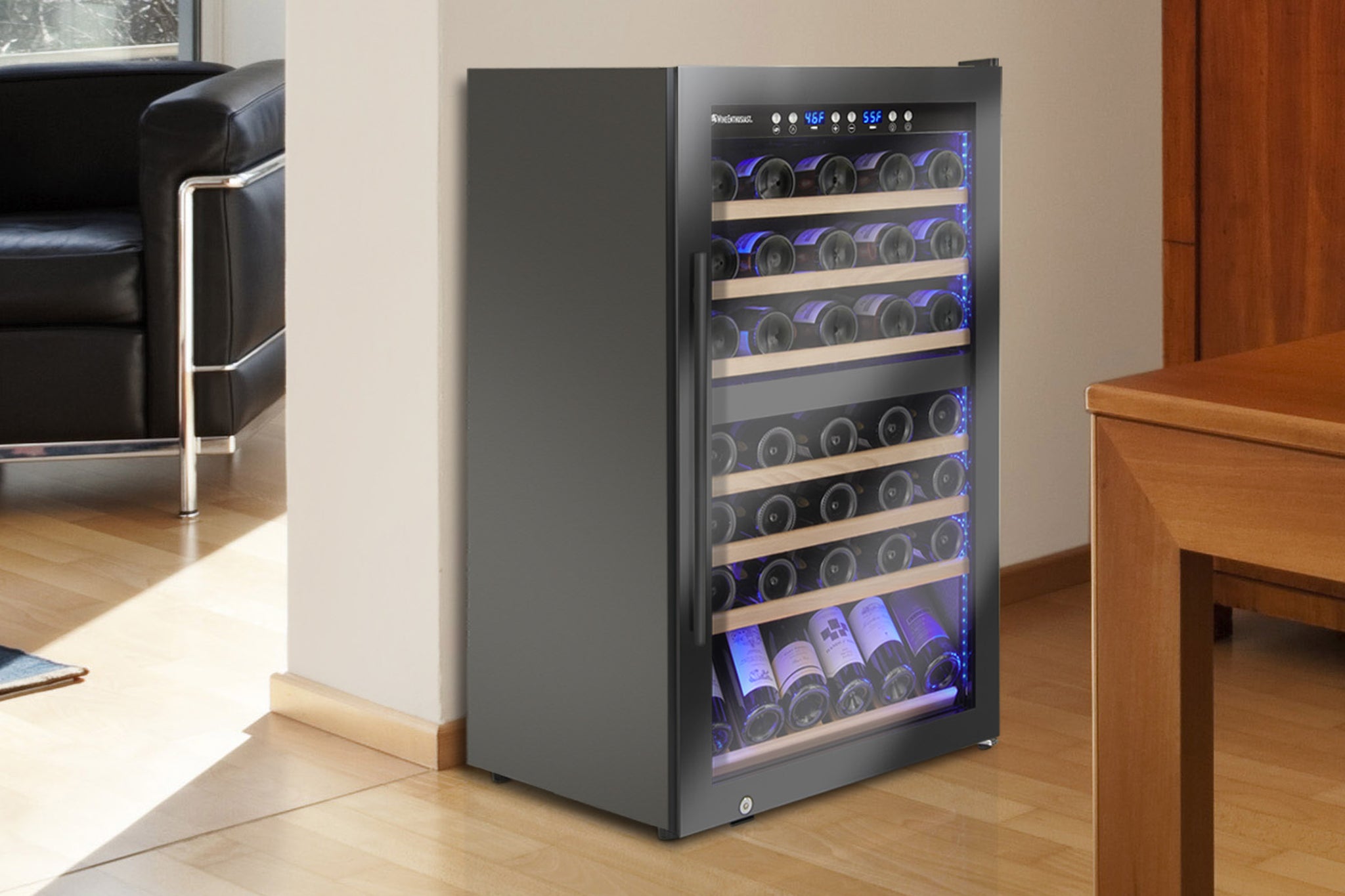
Are you a wine enthusiast looking to keep your collection perfectly chilled at home? Look no further! In this article, we will guide you through the process of selecting the best wine cooler for your home. Whether you have a small apartment or a spacious cellar, we have tips and recommendations that will help you find the ideal wine cooler to suit your needs. So, grab a glass of your favorite vintage and join us on this exciting journey to find the perfect wine cooler for your home.
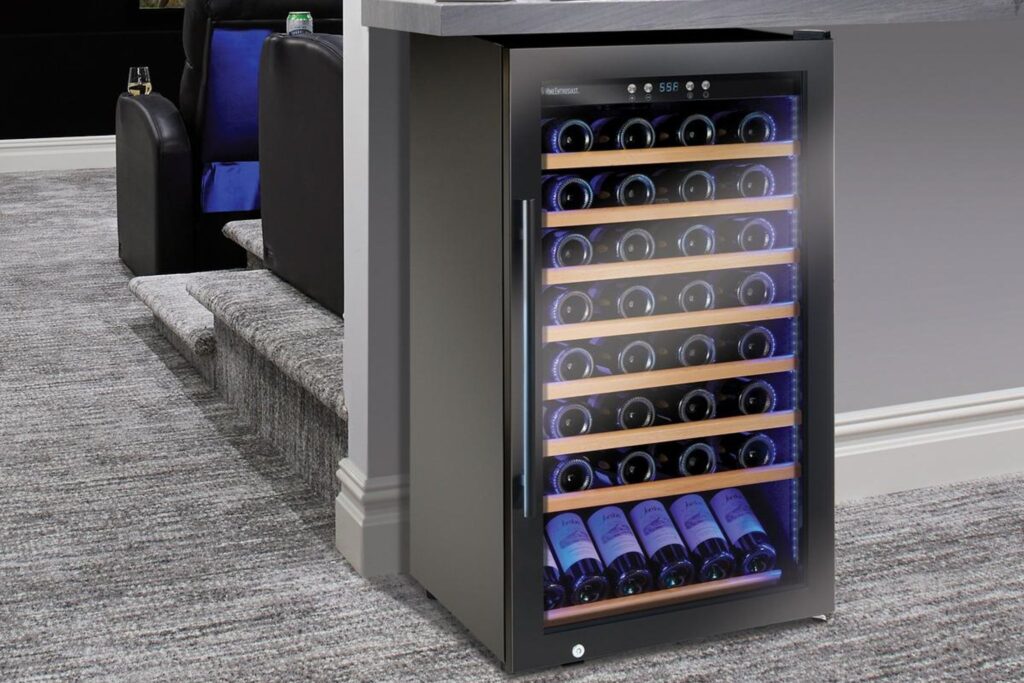
Factors to Consider when Selecting a Wine Cooler
When it comes to selecting a wine cooler for your home, there are several factors that you should consider. The right wine cooler can enhance your wine storage experience, ensuring that your wine is properly stored and maintained at its optimal conditions. Here are some important factors to consider when selecting a wine cooler:
Capacity
The capacity of a wine cooler refers to the number of wine bottles it can hold. Before purchasing a wine cooler, it’s important to determine your wine storage needs. Consider how many bottles of wine you currently have and how many you plan to add to your collection. This will help you determine the right capacity for your needs. It’s always better to choose a wine cooler with a slightly larger capacity to accommodate any future wine purchases or special occasions.
Temperature Control
Temperature control is crucial when it comes to wine storage. Different types of wines require different temperature ranges to mature properly. Most wine coolers offer a temperature range of 40°F to 65°F, which is suitable for both red and white wines. However, if you have a collection of both red and white wines, you may want to consider a wine cooler with dual-zone temperature control. This feature allows you to set separate temperature zones for red and white wines, ensuring that each type is stored at its optimal temperature.
Humidity Control
Maintaining the right humidity level is essential for proper wine storage. Low humidity can cause corks to dry out and allow air to enter the bottles, which can lead to wine oxidation. On the other hand, high humidity can promote the growth of mold and mildew. Look for a wine cooler that offers built-in humidity control mechanisms to ensure that your wines are stored in the ideal humidity conditions.
Energy Efficiency
Energy efficiency is an important consideration when selecting a wine cooler. Look for models that have an Energy Star certification, as these are designed to consume less energy and reduce greenhouse gas emissions. Energy-saving features such as insulated doors, LED lighting, and low-power consumption cooling systems can help minimize energy usage. Investing in an energy-efficient wine cooler not only helps the environment but also saves you money in the long run.
Size and Design
Consider the available space in your home when selecting a wine cooler. Measure the area where you plan to place the wine cooler to ensure that it fits properly. Take into account the clearance space needed for ventilation and ensure that the wine cooler can be easily accessed. Additionally, consider the design and aesthetics of the wine cooler. Choose a design that complements your home decor and personal style.
Noise Level
The noise level of a wine cooler can be an important factor to consider, especially if you plan to place it in a living area or open kitchen. Some wine coolers can produce noise due to the cooling system or built-in fans. Look for models with soundproofing features or low-noise cooling systems to minimize any disturbance.
Price
Consider your budget when selecting a wine cooler. Wine coolers come in a wide range of prices, depending on their capacity, features, and brand. Set a budget and look for models that offer the best value for your money. Remember that investing in a high-quality wine cooler can provide long-term benefits and protection for your wine collection.
Brand and Warranty
Choosing a reputable brand for your wine cooler is important to ensure quality and reliability. Research different brands and read customer reviews to gauge their reputation. Additionally, check the warranty offered by the manufacturer. A longer warranty period indicates that the brand stands behind the quality of their product.
Reviews and Recommendations
Reading reviews and recommendations from other wine enthusiasts can provide valuable insights when selecting a wine cooler. Look for reviews on reputable websites or ask for recommendations from friends or experts in the field. Hearing about the experiences of others can help you make an informed decision and find a wine cooler that meets your requirements.
Additional Features
Some wine coolers come with additional features that can enhance your wine storage experience. LED lighting can showcase your wine collection and create an aesthetically pleasing display. Digital controls make it easy to adjust and monitor the temperature settings. Door locks offer an extra level of security, especially if you have valuable or rare wines in your collection. UV protection helps prevent damage from sunlight, and vibration control minimizes any disturbances to the sediments in the wine bottles.
Types of Wine Coolers
There are different types of wine coolers available in the market, each catering to different needs and preferences. Understanding the different types can help you choose the most suitable wine cooler for your home:
Freestanding Wine Coolers
Freestanding wine coolers are designed to be placed anywhere in your home, as long as there is sufficient space and ventilation. They are versatile and can easily be moved if needed. Freestanding wine coolers come in various sizes and capacities, making them suitable for both small and large wine collections. They are a popular choice for those who want flexibility in placement and design options.
Built-in Wine Coolers
Built-in wine coolers are specifically designed to be integrated into cabinetry or built into a wall. They offer a seamless and integrated look, perfect for those who want a sleek and sophisticated storage solution. Built-in wine coolers typically have a front ventilation system, allowing them to be installed flush with surrounding cabinets. However, it’s important to ensure that you have the proper space and dimensions for installation.
Countertop Wine Coolers
Countertop wine coolers are compact and designed to sit on your countertop or any other suitable surface. They are ideal for small wine collections or for those who want quick and convenient access to their favorite wines. Countertop wine coolers usually have a smaller capacity but still provide adequate storage conditions. They are a great option for apartments, small kitchens, or limited spaces.
Dual-Zone Wine Coolers
Dual-zone wine coolers offer the flexibility of storing both red and white wines at their ideal temperatures. They feature two separate compartments with independent temperature controls. This allows you to set different temperatures for each zone, ensuring that your wines are stored at their optimal conditions. Dual-zone wine coolers are a popular choice for wine enthusiasts who have a mixed collection and want precise temperature control for each type of wine.
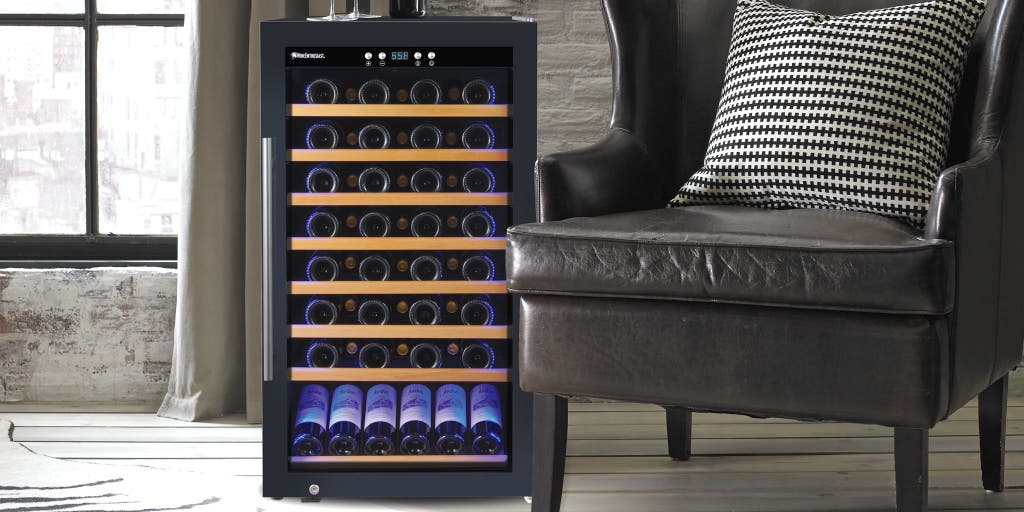
Capacity
Determining Your Wine Storage Needs
Before selecting a wine cooler, it’s important to determine your wine storage needs. Consider the number of wine bottles you currently have and how many you plan to add to your collection in the future. Think about the types of wines you enjoy and how long you plan to store them. This will help you determine the capacity of the wine cooler you require. It’s always better to choose a wine cooler with a slightly larger capacity than your current needs to accommodate any future wine purchases or special occasions.
Factors Affecting Capacity Requirements
Several factors can affect your capacity requirements when it comes to wine storage. The size of the bottles is an important consideration. Champagne bottles and larger wine bottles may require more space, reducing the overall capacity of the wine cooler. Additionally, if you purchase wine by the case or in bulk, you may need more storage space to accommodate the larger quantity. It’s also important to consider how you organize your wine collection. Some wine coolers offer flexible shelving options or adjustable racks, allowing you to customize the layout to your preferences and maximize the storage capacity.
Temperature Control
Temperature Range
Temperature control is crucial for proper wine storage. Different types of wines require different temperature ranges to mature and maintain their optimal flavors. For example, red wines are generally stored at warmer temperatures, around 55°F to 65°F, while white wines are best stored at cooler temperatures, around 45°F to 55°F. Sparkling wines, on the other hand, require even cooler temperatures, typically around 38°F to 50°F. When selecting a wine cooler, ensure that it offers a suitable temperature range to accommodate your wine collection.
Consistency and Precision
Consistency and precision in temperature control are key factors for an ideal wine storage environment. Fluctuations in temperature can have a negative impact on the quality and aging process of the wines. Look for a wine cooler that offers precise temperature controls with minimal temperature fluctuations. Some wine coolers use advanced temperature control systems, such as digital thermostats or sensors, to ensure accurate and consistent temperature settings.
Thermoelectric vs Compressor Cooling Systems
Wine coolers utilize either thermoelectric or compressor cooling systems. Thermoelectric wine coolers use a solid-state cooling technology that is quiet and vibration-free. They are more energy-efficient and have fewer mechanical components, resulting in a longer lifespan. However, thermoelectric wine coolers may not be as effective in extreme temperature conditions or for large capacity wine coolers. Compressor wine coolers, on the other hand, use a traditional refrigeration system and are better suited for larger wine collections and environments with high ambient temperatures. They provide precise temperature control and cooling power but may produce more noise and vibrations.
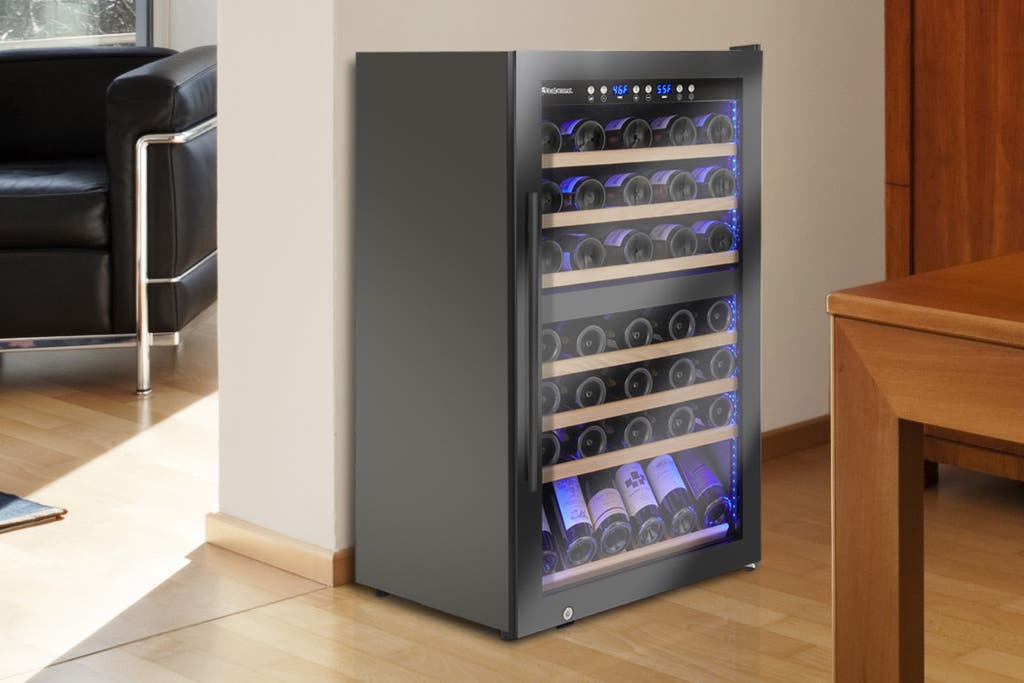
Humidity Control
Why is humidity control important?
Humidity control is crucial for proper wine storage. Both low and high humidity levels can have a negative impact on the quality and maturation of wines. Low humidity can cause corks to dry out, allowing air to enter the bottles and resulting in oxidation. This can lead to the deterioration of the wine’s flavors and aromas. High humidity, on the other hand, can promote the growth of mold and mildew, potentially ruining the labels and packaging of the bottles. Maintaining the right humidity level helps ensure that your wines are stored in the best possible conditions and maintain their quality over time.
Ideal humidity level for wine storage
The ideal humidity level for wine storage is between 50% and 80%. This range helps keep the corks moist, preventing them from drying out while also preventing excess moisture that can lead to mold and mildew growth. Most wine coolers have built-in humidity control mechanisms, such as humidifiers and dehumidifiers, to maintain the ideal humidity level. Some wine coolers also feature humidity displays or indicators, allowing you to easily monitor the humidity levels inside the unit.
Built-in humidity control mechanism
Many wine coolers come with a built-in humidity control mechanism to regulate the moisture levels. This can be in the form of humidity trays, water basins, or electronic hygrometers. Humidity trays or water basins can be filled with water to increase humidity levels, while electronic hygrometers measure and display the humidity levels inside the wine cooler. Some advanced wine coolers even offer precise humidity control settings, allowing you to adjust the humidity levels based on your specific needs.
Energy Efficiency
Energy Consumption
Energy efficiency is an important consideration when selecting a wine cooler. Since wine coolers are typically left running continuously, choosing an energy-efficient model can help reduce your energy consumption and lower your electricity bills. Look for wine coolers that have earned the Energy Star certification. These models are designed to meet strict energy efficiency guidelines set by the EPA. They consume less energy and produce fewer greenhouse gas emissions compared to non-certified models.
Energy-saving Features
There are several energy-saving features to look for when selecting a wine cooler. Insulated doors and UV-resistant glass help minimize temperature fluctuations and reduce the need for the wine cooler to work harder to maintain the desired temperature. LED lighting consumes less energy compared to traditional incandescent bulbs and produces less heat, reducing the strain on the cooling system. Some wine coolers also have low-power consumption cooling systems or advanced insulation materials, further enhancing energy efficiency.
Environmental Considerations
Selecting an energy-efficient wine cooler not only saves you money but also helps reduce your environmental impact. By choosing a model with lower energy consumption, you are contributing to the reduction of greenhouse gas emissions and minimizing your carbon footprint. Additionally, some wine coolers use eco-friendly refrigerants that have a lower environmental impact. Look for models that prioritize environmental sustainability and are designed with eco-friendly practices.
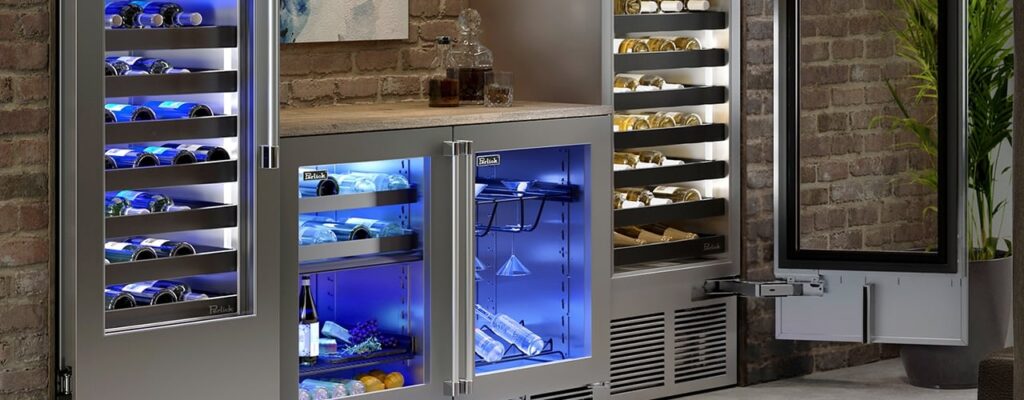
Size and Design
Available Space
Before selecting a wine cooler, assess the available space in your home. Consider the dimensions of the area where you plan to place the wine cooler. Measure the height, width, and depth to ensure that the wine cooler fits properly. Take into account any clearance space needed for ventilation, as some wine coolers require space around the unit for proper airflow. It’s also important to consider any obstacles or restrictions that may affect the placement of the wine cooler, such as doorways, cabinets, or other furniture.
Dimensions and Placement
Different wine coolers come in varying dimensions and sizes. Consider the capacity and dimensions of the wine cooler to ensure that it meets your storage needs and fits in the designated space. Some wine coolers have a taller design, while others are wider or deeper. Take into account any specific storage requirements, such as large or oversized wine bottles, and ensure that the wine cooler can accommodate them. Additionally, consider the placement of the wine cooler for easy access and convenience.
Door Design and Material
The door design and material of a wine cooler not only contribute to its aesthetics but also impact its functionality. Look for wine coolers with UV-resistant glass doors to protect your wines from harmful ultraviolet light. This helps prevent premature aging and degradation of the wines. Some wine coolers have reversible doors, allowing you to change the direction of the door swing to accommodate your space and preferences. Additionally, consider the type of door handle or lock mechanism for ease of use and security.
Interior Layout and Shelves
The interior layout and shelves of a wine cooler play a crucial role in organizing and storing your wine collection. Look for wine coolers that offer adjustable or removable shelves, as this allows you to customize the layout based on your bottle sizes and storage preferences. Slide-out or pull-out shelves make it easy to access the wines without disturbing other bottles. Some wine coolers even have specially designed shelves to accommodate larger or irregularly shaped bottles, such as champagne or magnum bottles.
Ease of Cleaning
Keeping your wine cooler clean is important for maintaining the quality of your wines. Look for wine coolers with easy-to-clean features, such as removable shelves or spill-proof trays. This makes it easier to wipe down and clean any spills or drips that may occur. Additionally, consider the material of the interior and exterior surfaces. Stainless steel or glass surfaces are generally easier to clean and maintain compared to textured or wood finishes.
Noise Level
Noise Production by Cooling Systems
The noise level of a wine cooler can be an important consideration, especially if you plan to place it in a living area or open kitchen. Some wine coolers can produce noise due to the cooling system or built-in fans. Compressor cooling systems tend to produce more noise compared to thermoelectric cooling systems. Understand that some level of noise is normal for wine coolers due to the refrigeration systems, but it’s important to find a balance between functionality and noise level.
Soundproofing Features
If noise level is a concern, look for wine coolers with soundproofing features. Some wine coolers are designed with advanced insulation materials that help reduce noise vibrations and minimize operational noise. Additionally, look for models with low-noise cooling systems or built-in fans that are designed to operate quietly. These features can help create a quieter wine storage environment without compromising the cooling performance or functionality of the wine cooler.
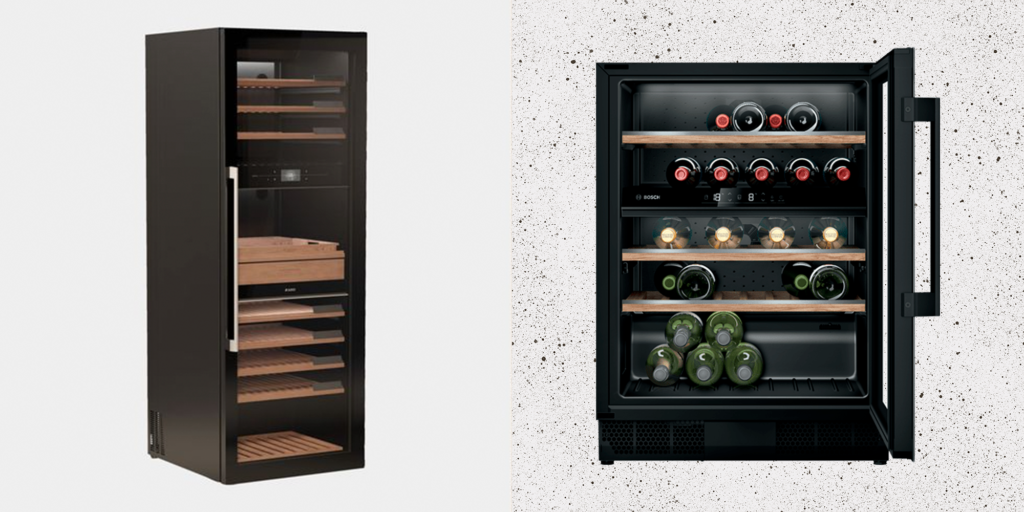
Price
Budget Considerations
Setting a budget is an important step when selecting a wine cooler. Determine how much you are willing to spend on a wine cooler and stick to that budget. Wine coolers come in a wide range of prices, depending on their capacity, features, and brand. Consider the long-term benefits and value a wine cooler can provide. While it may be tempting to choose a lower-priced option, investing in a high-quality wine cooler can result in better storage conditions and protection for your wine collection.
Value for Money
When evaluating the price of a wine cooler, consider the value that it offers. Look for wine coolers that provide the features and functionalities that are important to you at a reasonable price. Compare different models and brands to find the best value for your money. Consider the quality, durability, energy efficiency, and warranty offered by each wine cooler. Reading customer reviews and recommendations can also provide insights into the overall value and performance of the wine cooler.
Brand and Warranty
Choosing a reputable brand for your wine cooler is important to ensure quality and reliability. Research different brands and their reputation in the industry. Look for brands that specialize in wine storage solutions and have a history of producing high-quality products. Consider factors such as customer reviews, industry awards, and brand reputation when making your decision.
Additionally, check the warranty offered by the manufacturer. A longer warranty period indicates that the brand has confidence in the quality and performance of their product. Read and understand the warranty terms and conditions, including coverage and any exclusions. A reliable warranty can provide peace of mind and protection for your investment.
Reviews and Recommendations
Reading reviews and recommendations from other wine enthusiasts can provide valuable insights when selecting a wine cooler. Look for reviews on reputable websites or platforms that specialize in home appliances or wine-related products. Customer reviews can offer real-world experiences and feedback on the performance and functionality of the wine cooler. Pay attention to any common issues or concerns raised by multiple reviewers.
In addition to online reviews, seek recommendations from friends, family, or experts in the field. These individuals may have firsthand experience with specific wine coolers and can provide valuable insights and advice. Consider their recommendations and factor them into your decision-making process.
Additional Features
While the basic functionality of a wine cooler is to store and cool your wines, there are additional features that can enhance your wine storage experience. Consider these additional features when making your selection:
LED Lighting
LED lighting not only provides an aesthetically pleasing display for your wine collection but also offers practical benefits. LED lights produce less heat compared to traditional incandescent bulbs, helping to minimize temperature fluctuations inside the wine cooler. Some wine coolers have customizable LED lighting options, allowing you to choose the color or intensity of the lights to suit your preferences.
Digital Controls
Wine coolers with digital controls make it easy to adjust and monitor the temperature settings. Digital controls offer precise temperature adjustments, allowing you to maintain the ideal storage conditions for your wines. Some wine coolers even come with advanced features, such as touch screen controls or digital displays that show the current temperature and humidity levels.
Door Locks and Security
If you have valuable or rare wines in your collection, consider wine coolers with door locks or security features. Door locks provide an extra level of security, preventing unauthorized access to your wines. Some wine coolers also have temperature and door alarms that alert you if the temperature deviates from the set range or if the door is left open for an extended period.
UV Protection
UV protection is important for preserving the quality of your wines. UV rays from sunlight can cause premature aging and degradation of the wines. Look for wine coolers with UV-resistant glass doors or tinted glass that filters out harmful UV rays. This helps protect your wines from light damage and ensures that they age properly.
Vibration Control
Vibration can disturb the sediments in the wine bottles, affecting the aging and quality of the wines. Wine coolers with vibration control features help minimize vibration and maintain a stable storage environment. Look for wine coolers with built-in vibration dampening systems or specialized shelving designed to reduce vibrations.
In conclusion, selecting the ideal wine cooler for your home requires consideration of various factors. Capacity, temperature control, humidity control, energy efficiency, size and design, noise level, price, brand and warranty, reviews and recommendations, and additional features all play a role in finding the perfect wine cooler. By carefully evaluating these factors and understanding your specific needs and preferences, you can make an informed decision and find a wine cooler that ensures your wines are properly stored and preserved for years to come.

